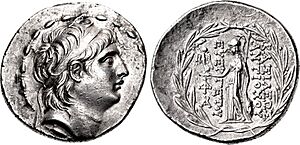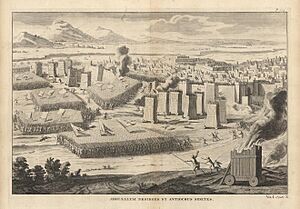Antiochus VII Sidetes facts for kids
Quick facts for kids Antiochus VII Euergetes |
|
|---|---|
| Antiochus VII Sidetes | |
 |
|
| Basileus of the Seleucid Empire | |
| Reign | July/August 138 – 129 BC |
| Predecessor | Diodotus Tryphon |
| Successor | Alexander II Zabinas (false son) Demetrius II Nicator (elder brother) |
| Born | c. 164 / 160 BC |
| Died | 129 BC (aged about 30) Ecbatana, Iran during the Battle of Ecbatana |
| Consort | Cleopatra Thea |
| Issue | Antiochus IX Cyzicenus Alexander II Zabinas (claimed) |
| Dynasty | Seleucid dynasty |
| Father | Demetrius I Soter |
| Mother | possibly Laodice V |
Antiochus VII Euergetes (meaning "the Benefactor") was a powerful king of the Seleucid Empire, a large kingdom that existed a long time ago. He ruled from 138 BC to 129 BC. People also called him Sidetes because he came from a city called Side in Asia Minor. He was the last strong king of the Seleucid Empire. After he died in battle, the empire became much smaller, mostly just Syria.
Contents
A King's Life
Early Years and Becoming King
Antiochus was one of the sons of King Demetrius I Soter. His brother was Demetrius II Nicator. Antiochus became king after his brother Demetrius was captured by the Parthians, who were another powerful group.
Antiochus married Cleopatra Thea. She had been married to his brother Demetrius before. Antiochus and Cleopatra Thea had a son named Antiochus IX Cyzicenus.
Reclaiming Lost Lands
During his nine years as king, Antiochus worked hard to get back lands that the Seleucid Empire had lost. He fought against a ruler named Diodotus Tryphon and won.
In 134 BC, Antiochus surrounded the city of Jerusalem. During the siege, he showed great respect for the Jewish people. He allowed them a seven-day break to celebrate an important religious festival. This impressed the Jewish leaders.
According to an ancient writer named Josephus, the Jewish leader John Hyrcanus gave Antiochus a lot of money to protect the city. Because Antiochus treated the Jewish people and their religion with respect, they called him Euergetes, which means "the Benefactor" or "the Giver of Good Things." Later, Jewish soldiers even helped Antiochus in his wars.
Battles in the East
Antiochus spent his last years trying to get back eastern lands that the Parthians had taken. He led a very large army, which included Jewish soldiers, to the east. He won two battles against the Parthian king, Mithridates I.
Antiochus managed to get back important regions like Mesopotamia, Babylonia, and Media for the Seleucid Empire. After these victories, his army settled down for the winter.
The Final Battle
While Antiochus's army was resting, the new Parthian ruler, Phraates II, was busy. He gathered a new army and encouraged people in the lands Antiochus had just taken to rebel. Phraates also released Antiochus's older brother, Demetrius II, hoping he would cause trouble for Antiochus.
In the winter of 130–129 BC, several towns rebelled and attacked Antiochus's soldiers. Antiochus rushed to help one of his small groups of soldiers with only his royal guards. He was ambushed in a valley by a large Parthian army led by Phraates II. Antiochus was killed in this battle, known as the Battle of Ecbatana. Most historians say he died fighting bravely.
Who Ruled Next?
Antiochus's son, Antiochus IX Cyzicenus, was supposed to be the next king. However, his older brother, Demetrius II, who had been released by the Parthians, also tried to reclaim the throne.
See Also
- List of Syrian monarchs
- Timeline of Syrian history
 | William M. Jackson |
 | Juan E. Gilbert |
 | Neil deGrasse Tyson |


